150 Basic Mandarin Phrases to Learn for Travel in China
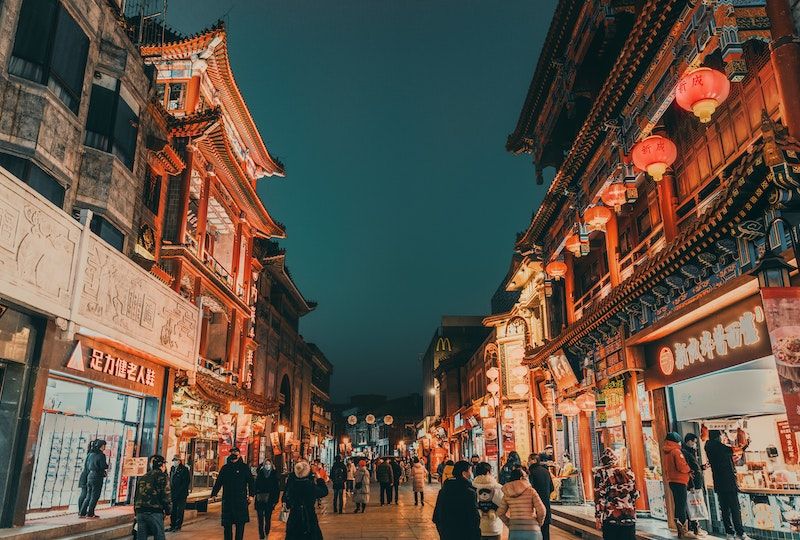
International travel can feel daunting, especially if you do not speak the language of your chosen destination. In addition to the challenges of navigating an unfamiliar place, you will face a language barrier when facing even the most basic tasks like checking in to a hotel or ordering a meal at a restaurant. Before you leave, it's a good idea to learn some basic words and phrases in the local language to help you get around. In fact, the decision to travel abroad often inspires people to get serious about learning a new language: the upcoming trip can provide a strong motivation to improve. Once you reach your destination, the ability to communicate in the local language, even at a basic level, will open the door to deeper, more meaningful interactions with locals.
We've put together the following list of words and phrases to help you navigate when traveling in China. Some Chiense people do speak English, especially younger people living in major cities like Shanghai and Beijing. But if you plan to venture into small towns or more remote places like China's national parks, it's important to master at least some of this vocabulary in case you can't find anyone who speaks English. Besides, local people will be happy that you took the time to learn some Mandarin. After all, connecting with people from a different culture is one of the most rewarding parts of travel, and you don't want to miss out!
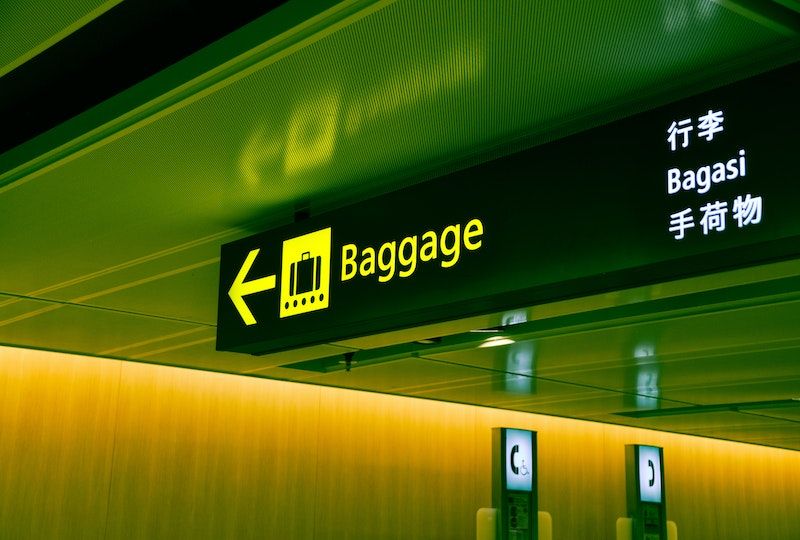
Useful Chinese Phrases for When You Arrive at the Airport
If you are a U.S. citizen traveling to China, you will need a visa. Make sure you read up on requirements and arrange your passport and visa in advance.
- Customs: 海关 (hăiguān)
- I have nothing to declare: 我没有需要申报的东西。 (wǒ méiyǒu xūyào shēnbào de dōngxi)
- Immigration: 边防检查 (biānfáng jiǎnchá)
- Passport: 护照 (hùzhào)
- Visa: 签证 (qiānzhèng)
- Baggage claim: 行李领取处 (xínglǐ lǐngqǔ chù)
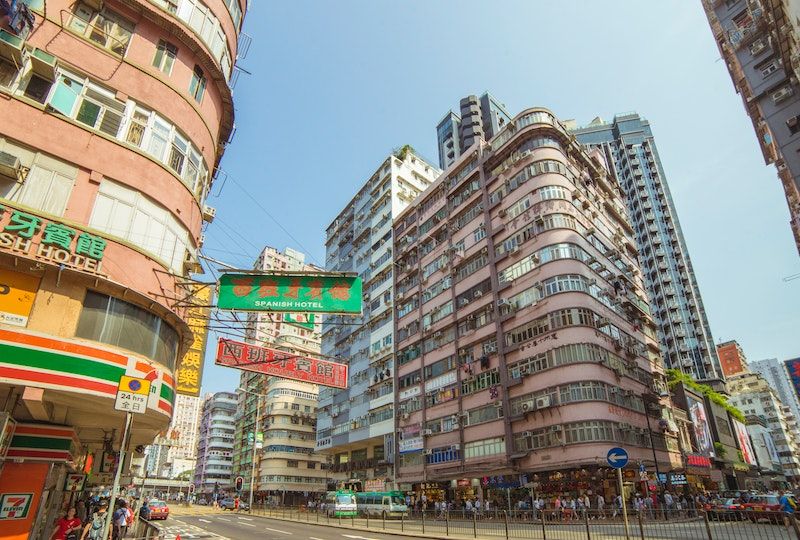
Places Around Town You Should Know How to Say in Mandarin
- Post office: 邮局 (yóujú)
- Supermarket: 超级市場 (chāojí shìchǎng)
- Department store: 百货商店 (bǎihuò shāngdiàn)
- Convenience store: 便利店 (biànlìdiàn)
- Library: 图书馆 (túshūguǎn)
- Gym: 体育馆 (tǐyùguǎn)
- Hospital: 医院 (yīyuàn)
- Clinic: 诊所 (zhěnsuǒ)
- Bank: 银行 (yínháng)
- Park: 公园 (gōngyuán)
- Hotel: 酒店 / 旅馆 (jiǔdiàn / lǚguǎn)
- Hostel: 青年旅舍 (qīngniánlǚshè)
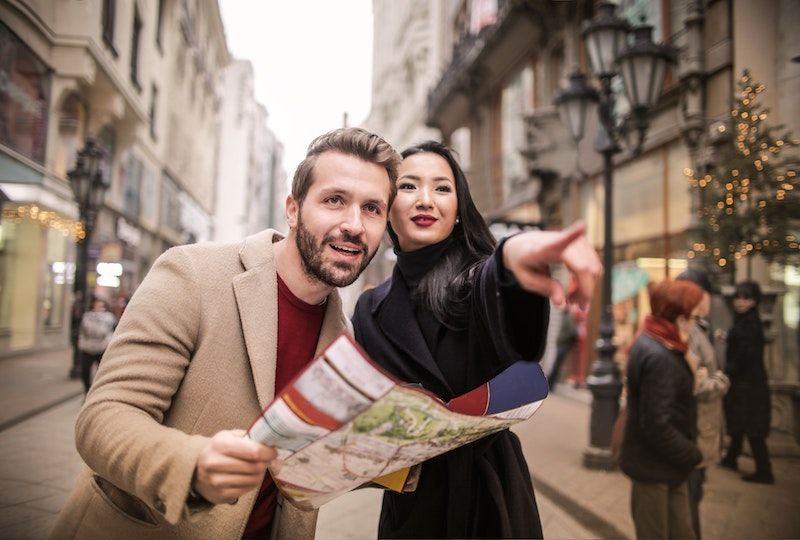
Asking and Understanding Directions and Distance in Mandarin
If you pick just one section from this list to study, it should probably be this one! Remember, it's not enough to know how to ask for directions: you also need to understand the answer. For even more detail on this topic, check out our posts on directions and locations in Mandarin.
Asking Where and How Far
- Excuse me: 打扰一下 (Dǎrǎo yīxià)
- May I ask: 请问 (qǐngwèn)
- Where: 在哪儿 / 在哪里 (zài nǎr / zài nǎlǐ)
- Excuse me, where’s the (restroom)? 请问,(卫生间) 在哪里?(Qǐngwèn, wèishēngjiān zài nǎlǐ?)
- How do I get to…: 怎么走 (zěnme zǒu)
- Excuse me, how do I get to the post office? 请问,邮局怎么走?(Qǐngwèn yóujú zěnme zǒu?)
- The nearest: 最近的 (zuìjìn de)
- Excuse me, how do I get to the nearest convenience store? 请问,最近的便利店怎么走? (Qǐngwèn, zuìjìn de biànlì diàn zěnme zǒu?)
- Excuse me, where’s the nearest supermarket? 请问,最近的超级市场在哪儿?(Qǐngwèn, zuìjìn de chāojí shìchǎng zài nǎ'er?)
- How far? 多远 (duō yuǎn)
- Very near: 很近 (hěn jìn)
- Not far: 不远 (bù yuǎn)
- Very far 很远 (hěn yuǎn)
- Excuse me, how far is the nearest library? 请问,最近的图书馆多远?(Qǐngwèn zuìjìn de túshū guǎn duō yuǎn?)
- Can I walk there? 我可以走路到那里吗?(Wǒ kěyǐ zǒulù dào nàlǐ ma?)
- Thank you: 谢谢 (xièxie)
Directions, Relative Locations, and Navigation Verbs
- Left: 左 (zǔo)
- Right: 右 (yòu)
- North: 北 (běi)
- South: 南 (nán)
- East: 东 (dōng)
- West: 西 (xī)
- Northeast: 东北 (dōngběi)
- Northwest: 西北 (xīběi)
- Southeast: 东南 (dōngnán)
- Southwest: 西南 (xīnán)
- In front of: 在... 前面 (zài... qiánmiàn)
- Behind: 在...后面 (zài... hòumiàn)
- Between: 在...中间 (zài... zhōngjiān)
- Next to: 在...傍边 (zài... pángbiān)
- Near: 在...靠近 (zài... kàojìn)
- Turn: 转 (zhuǎn)
- Go towards: 往 (wǎng)
- Go straight: 直走 (zhí zǒu)
- Go past: 過去 (guòqù)
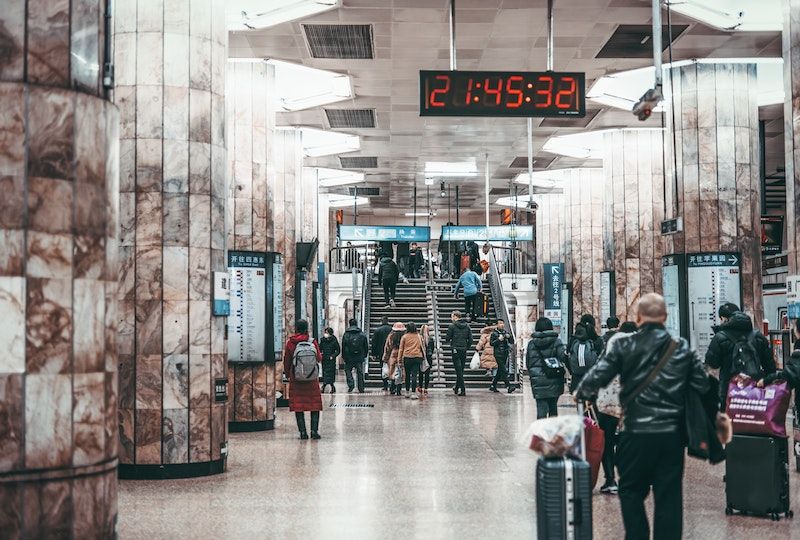
Mandarin Phrases for Modes of Transportation
China boasts a robust transit network with straightforward rail, air, and bus travel within the country and good subway systems in most major cities. Traveling by train is a quintessential China experience and a great way to see the country. Keep in mind, sleeper berths and seats are both split into soft and hard varieties on Chinese trains, with an upcharge for softer and roomier accomodations. Some trains even sell standing space, so check carefully before you purchase your ticket.
Tickets: 票 (piào)
- One-way ticket: 单程票 (dānchéng piào)
- Return ticket: 往返票 (wǎngfǎn piào)
- Ticket machine: 售票机 (Shòupiàojī)
- Departure date: 出发日期 (chūfā rìqī)
- Return date: 返回日期 (fǎnhuí rìqī)
- Departure station: 出发站 (chūfā zhàn)
- Arrival station: 到达站 (dàodá zhàn)
- Where can I buy a ticket? 在哪里买票? (Zài nǎli mǎi piào?)
- How much does a ticket to (Shanghai) cost? 一张到 (上海) 的票多少钱? (Yī zhāng dào Shànghǎi de piào duōshǎo qián?)
Train station: 火车站 (huǒchēzhàn)
- Hard sleeper: 硬卧 (yìng wò)
- Soft sleeper: 软卧 (ruǎn wò)
- Upper / middle / lower berth: 上 / 中 / 下 铺 (shàng / zhōng / xià pù)
- Soft seat: 软座 (ruănzuò)
- Hard seat: 硬座 (yìng zuò)
- Standing ticket: 无座 (wú zuò)
- Seat number: 座位号 (zuòwèi hào)
- When does the train arrive / depart? 火车几点到 / 出发? (Huǒchē jǐdiǎn dào / chūfā?)
- The train is running late: 火车晚点了。 (Huǒchē wǎndiǎn le.)
Subway station: 地铁站 (dìtiězhàn)
- Entrance: 入口 (rùkǒu)
- Exit: 出口 (chūkǒu)
- Line number (3): (三) 号线 (sān hào xiàn)
- The next stop: 下一站 (xiàyīzhàn)
Airport: 飞机场 (fēijī chǎng)
- Airplane: 飞机 (fēijī)
- Flight: 航班 (hángbān)
- Check in: 登记 (dēngjì)
- Boarding pass: (登机牌, dēngjīpái)
- Drop off luggage: (托运行李; tuōyùn xínglǐ)
- Security: 安全检查 (ānquán jiǎnchá)
- Do I need to take out my computer? 我把电脑需要单独拿出来吗? (wǒ bǎ diànnǎo xūyào dāndú ná chūlái ma?)
- Terminal: 航空站 / 候机楼 (hángkōngzhàn / hòujīlóu)
- Departure Gate: 登机口 (dēngjīkǒu)
- Economy class: 经济舱 (jīngjì cāng)
- Business class: 商务舱 (shāngwù cāng)
- First class: 头等舱 (tóuděng cāng)
Taxi: 出租车 (chūzūchē)
- Hail a taxi: 打车 (dǎchē)
- Taxi stand: 汽车站 (qìchē zhàn)
- Where do you want to go? 你去哪儿?(nǐ qù nǎ ér?)
- I want to go to the airport: 我要去飞机场 (wǒ yào qù fēijīchǎng.)
- Intersection: 路口 (lùkǒu)
- You can stop here: 这儿停车 (zhèr tíng chē)
Bus stop / bus station: 公交车站 (gōngjiāochē zhàn)
- Does this bus go to Wangfujing? 请问这趟车去往王府井吗? (Qǐng wèn zhè tàng chē qù wǎng Wángfǔjǐng ma?)
- Where should I get off? 我应该在哪站下车? (Wǒ yīnggāi zài nǎ zhàn xià chē?)
- How many stops? 几站?(jǐ zhàn?)
- Do I need to transfer? 需要专车吗?(Xūyào zhuǎnchē ma?)
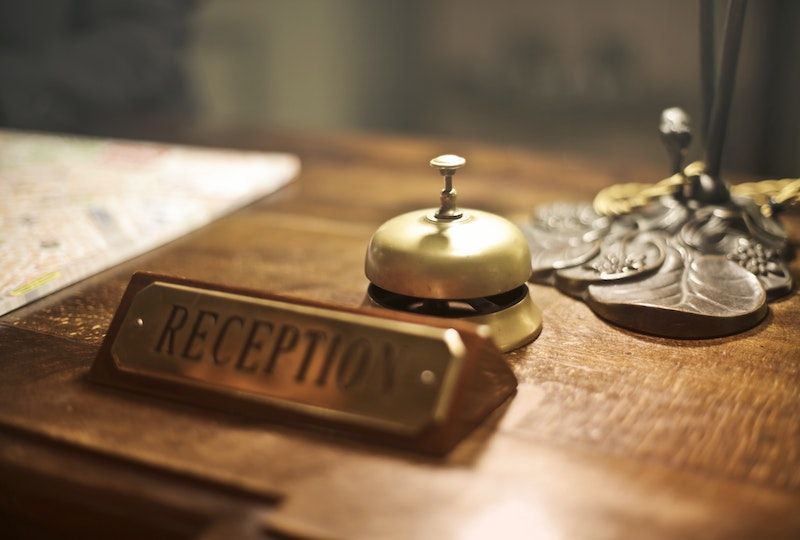
Mandarin Phrases for Hotel Stays
- Book a room: 订房 (dìng fáng)
- Deposit: 押金 (yājīn)
- Key: 钥匙 / 房卡 (yàoshi / fángkǎ)
- Standard room: 标准房 (biāozhǔn fáng)
- Single room: 单人房 (dān rén fáng)
- Suite: 套房 (tào fáng)
- Elevator: 电梯 (diàntī)
- Wi-Fi password: Wi-Fi 密码 (Wī-Fī mìmǎ)
- Check out: 退房 (tuìfáng)
- The…is broken: …坏了。 (...huàile.)
- Air conditioning: 空调 (kōngtiáo)
- Toilet: 厕所 (cèsuǒ)
- Shower: 淋浴 (lín yù)
- Could you please give me another…? 请问可以再给我一个...吗?(qǐng wèn kě yǐ zài gěi wǒ…ma?)
- Blanket: 毯子 (tǎnzi)
- Towel: 毛巾 (máojīn)
- Pillow: 枕头 (zhěntou)
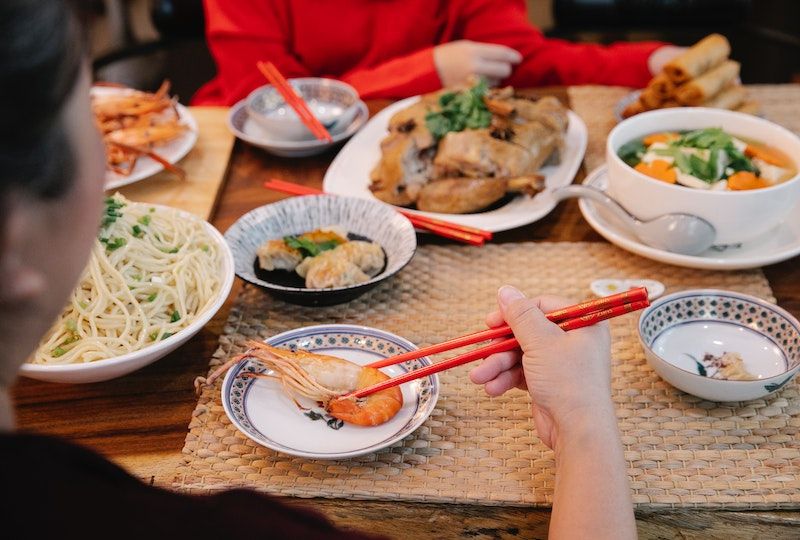
Useful Mandarin Vocabulary for Eating At Restaurants
For many travelers, tasing the local cuisine is the highlight of any trip abroad. Authentic Chinese cuisine spans many regions and ethnicities, so choosing a restaurant can feel overwhelming. Check out these posts for an introduction to Chinese cuisine and a guide for ordering at restaurants, plus the list below for some basic phrases.
- Restaurant: 餐厅 (cāntīng)
- Bar / pub: 酒吧 (jiǔbā)
- Cafe / coffee shop: 咖啡馆 (kāfēiguǎn)
- Bakery: 面包店 (miànbāo diàn)
- Phrases you’ll encounter at restaurants:
- Welcome: 欢迎光临 (huān yíng guāng lín)
- Please can you give me a menu? 请给我菜单吗?(qǐng gěi wǒ cài dān ma?)
- Waiter/Waitress: 服务员 (fú wù yuán)
- I want this one: 我要这个。 (wǒ yào zhè ge.)
- I’m ready for the check: 买单, 谢谢. (mǎi dān, xiè xie.)
- I don’t eat meat: 我不吃肉。(wǒ bù chī ròu.)
- I’m allergic to…: 我对...过敏 (Wǒ duì…guòmǐn.)
- Iced or hot? 冰的还是热的? (Bīng de háishì rè de?)
- Do you want it heated up? 需要加热吗? (Xūyào jiārè ma?)
- Do you want it here or to take away? 在这喝还是带走?(zài zhè hē háishì dài zǒu?)
- Here: 在这里。(zài zhè lǐ)
- Take away: 打包 (dǎ bāo)
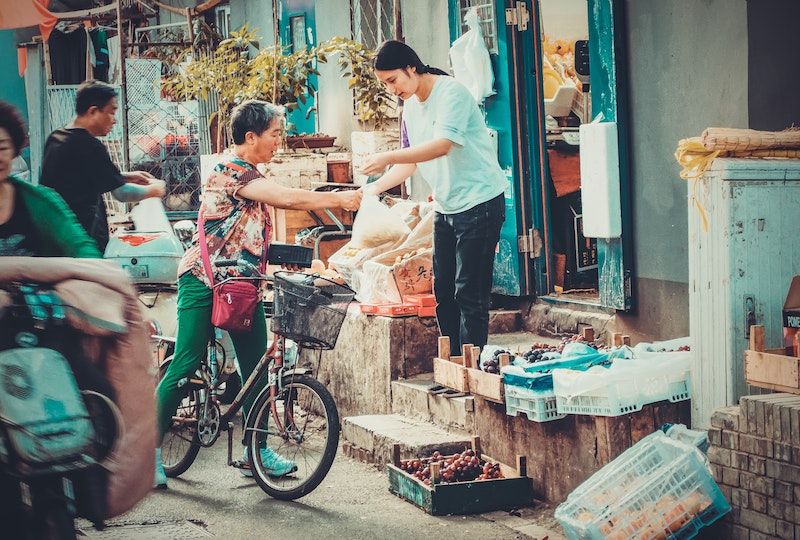
Mandarin Phrases for Shopping and Sightseeing
In some settings, haggling is customary and even expected in China. This is especially true at small shops or market stalls selling all types of goods, from souvenirs to fresh produce. In fact, if you don't barter the price down in these settings, you're almost sure to get ripped off! Check out our guide to haggling and brush up on your measure words as well, and you're sure to succeed during your shopping trips in China!
- What are you looking for? 你打算买什么? (nĭ dăsuàn măi shénme?)
- I want to buy (a bag): 我想买一个(包) (Wǒ xiǎng mǎi yīgè (bāo))
- How much? 多少钱? (Duōshǎo qián?)
- I’m just looking: 我只是看看 (wŏ zhĭ shì kànkan)
- It’s too expensive: 太贵了 (tài guì le)
- Please make it cheaper: 便宜点 (Piányí diǎn)
- Pay with card: 刷卡 (shuākǎ)
- Cash: 现金 (xiànjīn)
- What size? 多大号的?(duō dàhào de?)
- Small: 小号 (xiăo hào)
- Medium: 中号 (zhōng hào)
- Large: 大号 (dà hào)
- Fitting room: 试衣间 (shì yī jiān)
- Could you please take my picture? 能麻烦您帮我照个相吗?(Néng máfán nín bāng wǒ zhào gè xiàng ma?)

Communicate Confidently in Mandarin on Your Next Trip to China!
We feel certain that learning some of the words and phrases in this article will help you feel confident enough to communicate in Mandarin when you travel to China. You can supplement this vocabulary with phrases to use in an emergency, so you're ready for anything on your trip. You can also work with a Speechling tutor for even more practice, plus feedback on your pronunciation from a native speaker. Hopefully your travel plans encourage you to take your Chinese studies to the next level and connect with local people during your travels!
